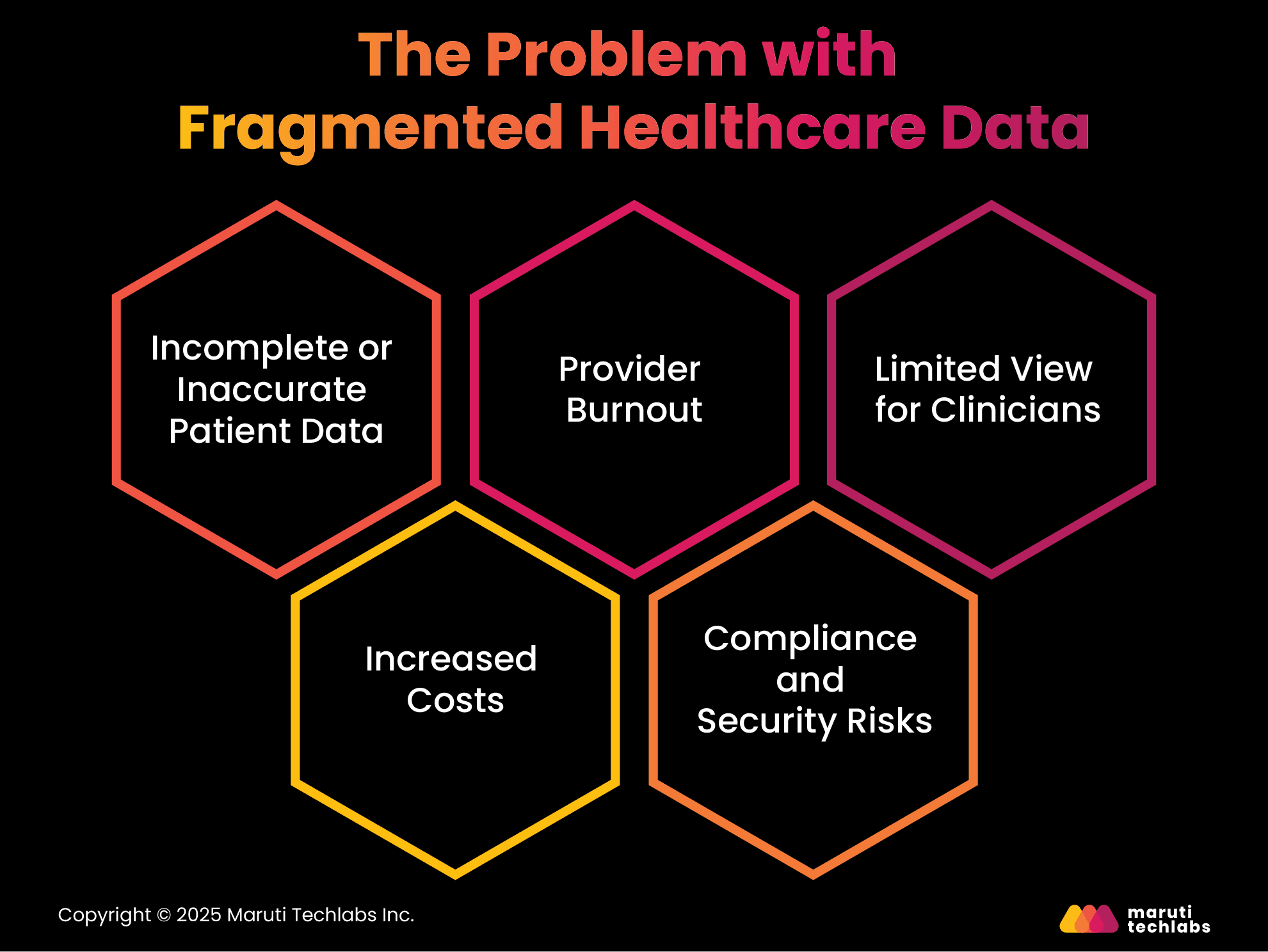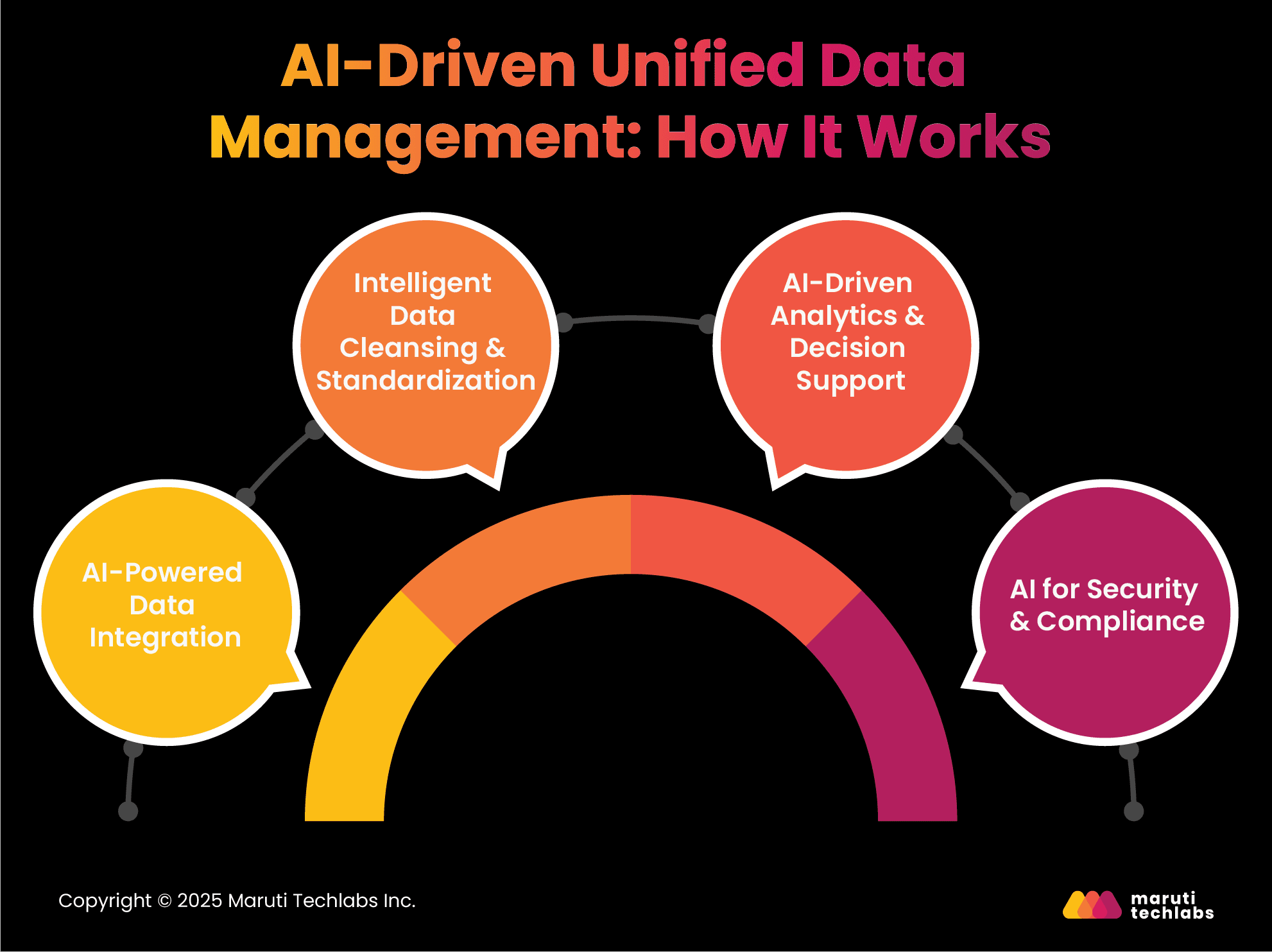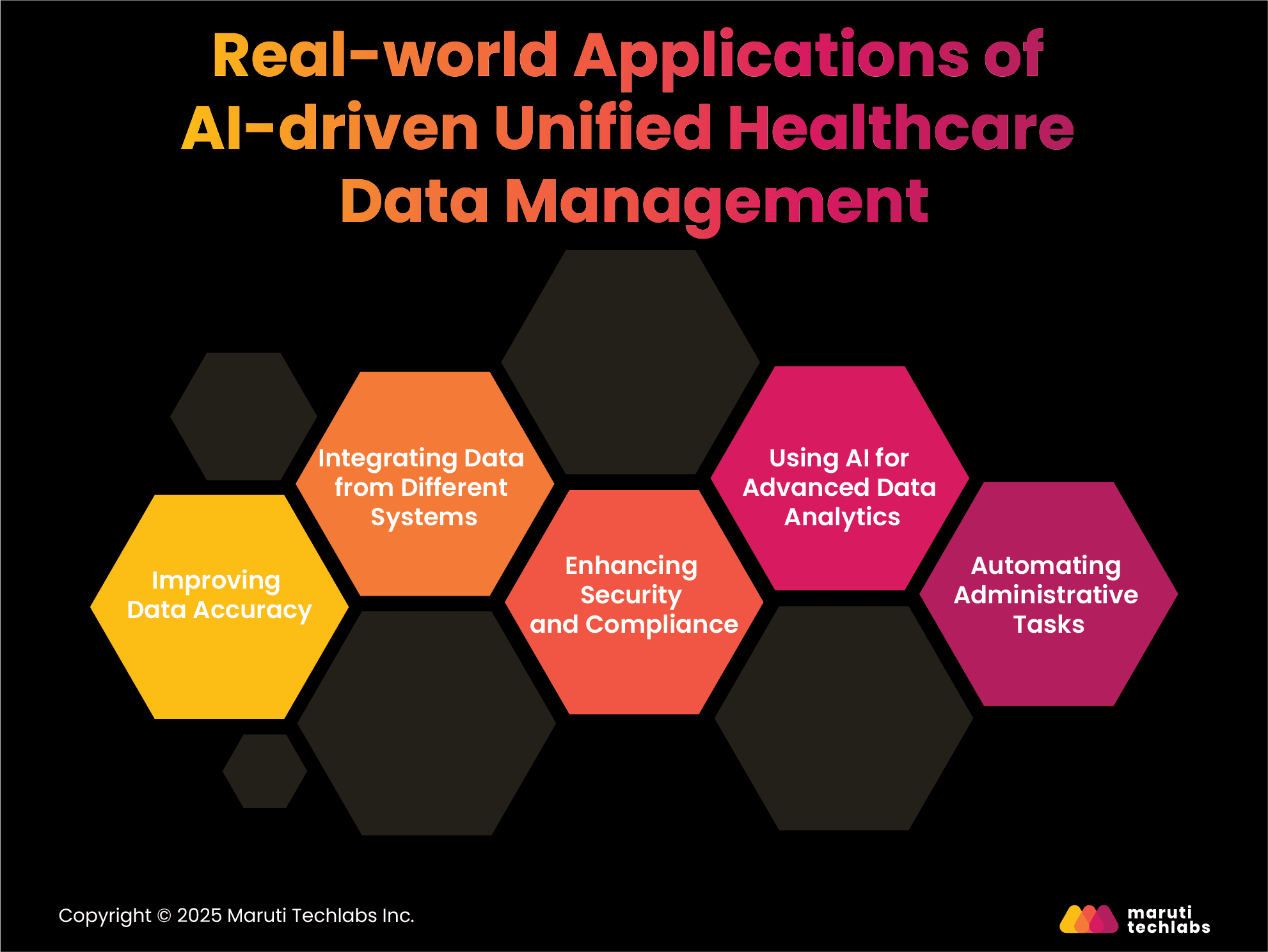

AI & the Future of Healthcare: Smarter Data, Better Care






Every day, hospitals handle massive amounts of data—patient records, test results, billing details, and research. But when this data is scattered across different systems, it slows down care, increases mistakes, and makes operations more complex. AI is changing this by organizing and analyzing data in real-time and making healthcare more connected and efficient.
Predictive analytics alone can cut administrative costs by 15%, saving the U.S. healthcare system over $150 billion every year. Real-time data analysis is already making a difference, reducing patient deaths by 26% and cutting hospital-acquired infections by 300%. These numbers show how better data management is making healthcare safer and more efficient.
In this blog, we’ll explore how fragmented healthcare data affects patient care, the challenges it creates, and how AI-driven unified data management is transforming the industry with real-world applications.
Healthcare runs on data. Every patient visit, diagnosis, prescription, and insurance claim generates information that needs to be stored, accessed, and shared. However, that data is scattered across different systems—hospitals, clinics, labs, pharmacies, and insurance providers all have their records. These systems don’t always communicate with each other, creating data silos that make patient care more complicated than it should be.
Mistakes happen when healthcare providers can’t see the complete picture of a patient’s history. Doctors might miss important details, ask for unnecessary tests, or prescribe medications that don’t meet a patient’s needs. In emergencies, delays in accessing critical information can mean the difference between life and death.
Beyond patient care, data silos also drive up healthcare costs. Duplicate tests and procedures waste time and money. Hospitals spend billions dealing with inefficiencies caused by poor data sharing. Meanwhile, insurers struggle to detect fraud because claim data is fragmented across multiple sources.
This problem isn’t new. For decades, healthcare has advanced by breaking down complex systems into specialized areas. While this has led to incredible medical breakthroughs, it has also created a fragmented approach where information is managed in isolation. Most industries have found ways to connect their data, but healthcare still struggles to do the same.
To improve patient care, the industry needs a better way to manage data—one that makes it easier for doctors, hospitals, and insurance providers to share information, reduce costs, and make better decisions for healthier outcomes.
When patient information is spread across different systems that don’t work together, it frustrates doctors and patients. Important details can get lost, leading to mistakes, treatment delays, and extra work for healthcare providers.
Instead of focusing on care, doctors often spend time searching for records or requesting the same tests again.

Let’s examine how this disjointed system affects healthcare.
Inaccuracy in medical records is more common than we realize, like incorrect diagnoses, outdated prescriptions, or missing test results. Without a clear system, these mistakes can go unnoticed and create confusion. Patients might get the wrong treatment or feel stressed for no reason. It's even more difficult for older adults and people with ongoing health issues as they see different doctors and have to remember their medical history to avoid mistakes.
Doctors and nurses already work long hours, and dealing with fragmented data only adds to their stress. Rather than focusing on patient care, they waste time gathering medical history from different places. Doing the same tedious work over and over leads to frustration and burnout, causing many experienced professionals to leave the field.
A complete medical history is essential for accurate diagnosis and treatment. However, when different providers store data separately, patients must repeat their medical history every visit. This lack of a unified record can lead to missed details, conflicting treatments, and poor patient experiences.
Fragmented data impacts care and drives up costs. Due to misdiagnosis, patients may undergo duplicate tests, experience delayed treatments, or require emergency care. Hospitals also waste resources managing multiple systems, increasing administrative costs.
Different healthcare systems have different security measures, which increases the risk of data breaches. Regulations like HIPAA require strict protection of medical data. However, without a clear and consistent system, it becomes complicated to follow these rules. A centralized system helps safeguard patient data while meeting legal requirements.
Fixing these problems means moving toward a system where all medical data is connected and easily accessible. This will help doctors work more efficiently, improve patient care, and create a smoother, more reliable healthcare experience for everyone.
AI helps in health data management so that doctors can access, clean, analyze, and protect it easily.

Here’s how it helps:
Healthcare data is scattered across different systems, making it hard to see a patient’s full history. AI helps by collecting data from records, lab results, scans, and devices in one place. This way, doctors don’t have to search multiple systems.
For example, AI arranges data from different records into a standard format, making it consistent across hospitals. It also improves interoperability by using standard protocols and makes it easier for hospitals and clinics to share data. With a well-integrated system, doctors can make better decisions, avoid repeating tests, and give patients better care.
Healthcare data often contains errors, missing details, or duplicate records. AI can automatically scan large amounts of data to identify and fix these inconsistencies. AI helps keep patient records accurate without extra work. It fills in missing details, removes duplicates, and fixes errors automatically, so doctors don’t have to do it by hand.
AI helps find valuable patterns in patient data. It can spot health trends, predict disease outbreaks, and suggest better treatments. For example, AI can look at medical history, daily habits, and genetics to find people who might get sick and help doctors act early.
AI-powered analytics helps healthcare organizations process vast amounts of data to recognize patterns and make informed decisions. One key benefit is pattern recognition, where AI detects trends in medical data that may go unnoticed by humans. This is particularly useful in diagnosing diseases early and improving treatment plans.
AI improves the patient experience by studying feedback from surveys, social media, and medical records. It helps hospitals understand common issues, improve services, and provide more personal care.
Deep learning, a type of AI, is especially valuable in analyzing complex medical data like images, videos, and audio. For example, AI can scan medical images to detect abnormalities, helping doctors diagnose conditions more accurately and efficiently.
Keeping patient data safe is essential. AI helps by spotting threats before they cause problems. Data breaches in healthcare can be very costly, so strong security is necessary.
Instead of relying on traditional rule-based security systems, organizations can use AI-driven compliance frameworks to monitor access points and detect suspicious activities continuously. AI also helps hospitals follow healthcare data privacy regulations like HIPAA by ensuring that patient data is handled securely and only accessed by authorized personnel.
Health data management using AI helps healthcare providers keep patient data safe and earn their trust.
We have already discussed how health data management is a challenge and AI helps solve this problem by bringing all the data together, improving accuracy, security, and efficiency.

Let us see how AI is making a difference in healthcare data management:
Healthcare records often have errors, missing details, or duplicate entries. These mistakes can lead to wrong diagnoses and improper treatments. AI helps by scanning large amounts of data to find and fix these issues automatically.
For example, AI can detect sudden, unexplained changes in a patient’s medical history and flag them for review. It can also compare data from different sources to check for consistency. This reduces human errors and ensures healthcare providers have the right information when treating patients.
Many hospitals and clinics use different electronic health record (EHR) systems that don’t always work together. This makes it difficult to share information. AI solves this problem by combining data from various sources, such as medical records, lab results, and wearable devices, into a single system.
For example, AI can standardize data from different hospitals, ensuring it follows the same format. This allows doctors to access complete patient histories without switching between multiple systems. It also improves coordination between healthcare providers, leading to better patient care.
Patient data is sensitive and needs to be protected from cyber threats. AI strengthens security by detecting unusual activity and alerting healthcare providers before a data breach happens.
For instance, AI can flag this as suspicious if an employee suddenly accesses an unusually high number of patient records. AI also helps hospitals follow healthcare data privacy regulations like HIPAA by tracking who accesses patient data and ensuring that only authorized personnel can view it.
AI can analyze large amounts of healthcare data to find patterns and predict health trends. This helps doctors make better decisions and improve patient outcomes.
For example, AI can study past medical records to predict which patients are at risk of developing chronic diseases. It can also analyze data from wearable devices to monitor a patient’s health in real time and detect early warning signs of illness.
Hospitals spend a lot of time on paperwork, billing, and scheduling. AI helps by automating these tasks, allowing healthcare staff to focus on patient care.
For example, AI can speed up insurance claims processing by checking for missing or incorrect information before submission. It can also help schedule patient appointments by analyzing doctor availability and patient preferences.
AI is transforming healthcare data management by improving accuracy, integrating records, enhancing security, analyzing data, and automating tasks. By adopting AI-driven solutions, healthcare providers can reduce errors, improve efficiency, and offer better care to patients.
AI is transforming how healthcare manages data—making patient records more accurate, improving security, and simplifying operations. As hospitals and insurers go digital, handling data efficiently will be more important than ever. Those who use AI solutions can cut costs, improve patient care, and stay ahead in the industry.
At Maruti Techlabs, we use AI to help healthcare providers manage data more easily, reduce inefficiencies, and make better decisions for patient care. Our solutions ensure seamless, secure, and intelligent healthcare data management. Learn more about our AI services.
Not sure where to start with AI in your healthcare organization? Try our AI Readiness Assessment Tool to evaluate your current capabilities and discover actionable steps to move forward with AI adoption.
Healthcare data management involves collecting, storing, organizing, and protecting health data throughout its lifecycle. It ensures data security, confidentiality, and accessibility for authorized users.
Advanced systems help analyze diverse datasets from various sources, supporting decision-making in applications and medical devices. It includes structured and unstructured data, clinical records, financial data, and supply chain management, helping improve patient care and operational efficiency.
Clinical data management ensures the quality and security of data used in research studies. It helps speed development, reduce costs, prevent data loss, and ensure accuracy. A well-managed dataset supports statistical analysis, reporting, and database transfers, ensuring data integrity. It plays a key role in demonstrating the safety and compliance of medical products while maintaining a reliable and usable dataset for decision-making.
Data quality management ensures healthcare data is accurate, complete, timely, and consistent. High-quality data improves clinical decisions, patient outcomes, and operational efficiency. It reduces errors, enhances compliance, and supports evidence-based treatments.
Poor data can lead to misdiagnosis and safety risks. Healthcare organizations use governance frameworks, analytics, and interoperable systems to maintain data integrity and ensure reliable decision-making.
Healthcare organizations save costs by digitizing and streamlining patient data through Electronic Health Records (EHRs), reducing errors and improving efficiency.
Advanced analytics optimize supply chain management by tracking metrics and automating processes like requisitions and invoices. Some hospitals have reported annual savings of up to $10 million using analytics to improve operations and reduce waste.
AI improves healthcare data management by enhancing accuracy, efficiency, and compliance. Traditional methods struggle with growing data complexity, leading to errors and inefficiencies. AI automates data processing, reduces risks, and ensures regulatory compliance.
AI-powered tools help manage large datasets, streamline workflows, and improve decision-making, ultimately enhancing patient care and operational performance.


